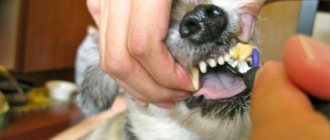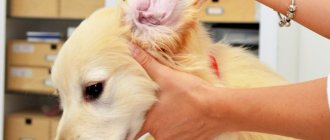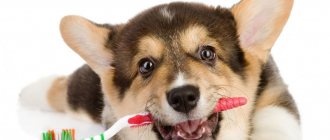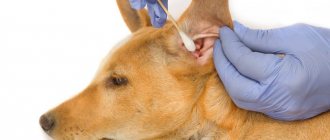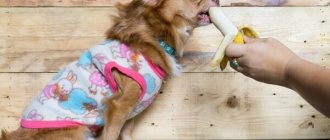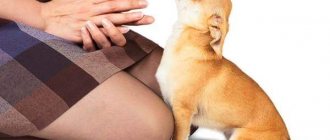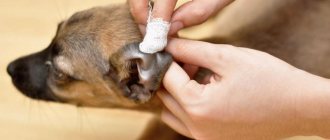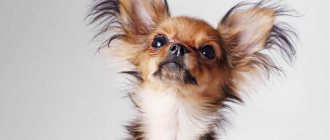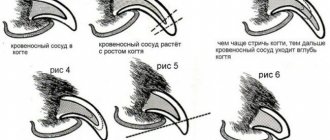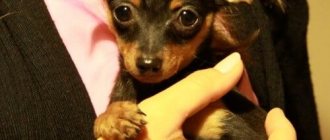Chihuahuas are one of the dog breeds that require special dental care.
The fact is that due to the tiny size of these Mexican dogs, puppies often have problems forming the correct bite.
But adult representatives of this breed also have oral diseases, which is why even a relatively young dog can lose one tooth after another.
How does the process of growth and change of teeth in a Chihuahua proceed and what can the owner do to ensure that his pet has a correct and beautiful bite, and the teeth are preserved until the pet’s advanced age?
How many teeth does a Chihuahua have?
Chihuahuas are born without teeth: their first four canines appear only at the age of two weeks.
By 1-1.5 months, the baby should already have a full set of baby teeth, consisting of canines, incisors and premolars.
At the same time, it is very important that the first premolar has not yet come out at this age, since its appearance before the change of teeth is fraught with problems with bite in the future.
The number of teeth after they are replaced with permanent ones in a Chihuahua should be 42 teeth: 22 on the lower jaw and 20 on the upper.
Do I need to clean it and how often should I do it?
Most dogs can simply chew on special treats or toys to clean their teeth, and Chihuahuas can be given these too . But you shouldn’t count on the fact that with the help of such devices it will be possible to completely rid your dog of dental plaque.
Additionally, many of these toys and treats are quite hard and can damage your pet's teeth.
NOTE!
One of the breed characteristics of Chihuahuas is the softness and fragility of the bones, due to which the fontanel on their head may not heal until the end of their lives.
For the same reason, Chihuahua teeth are very susceptible to premature wear, as well as caries, which mainly affects the lower part of the tooth.
Chihuahuas require special dental cleaning . This procedure is recommended to be carried out twice a week, but if the need arises, it can be done more often.
Expert opinion
Tolkachev Andrey Mikhailovich
veterinarian
“Due to their breed characteristics, Chihuahuas are very susceptible to dental diseases and injuries. Caries, breakage and fracture of teeth are not uncommon for them. In order to avoid these problems, you need to regularly brush your dog's teeth using a special brush. During the procedure, it is unacceptable to press or rub your teeth too hard, as this can lead to damage. If time is lost and the plaque has hardened so much that it can no longer be removed with a brush, then you should contact the clinic to remove it using a gentle method.”
Water treatments
It is enough to wash your Chihuahua with specialized shampoo once a quarter for hygienic purposes. Human shampoo is not suitable because... it can strip your dog's skin of essential oils, leading to hair loss, dryness and brittleness! You can bathe without shampoo more often if the dog likes water treatments, but without enthusiasm, no more than once every 2 weeks.
The water should be warm, optimal temperature: 35-40°C. It is important to ensure that water does not get into your ears. At the end of the procedure, wipe the dog's fur dry with a clean and warm cotton towel, or use a hairdryer.
Cleaning Methods
Special toys or treats
With the help of such devices you can clean your pet’s teeth quite well..
Before giving a puppy or adult Chihuahua such a toy or treat, you need to make sure that the item does not have sharp edges or corners that could injure the dog, and that the device itself is soft enough and will not harm the teeth.
Toothbrush for dogs
It is not difficult to choose a brush and toothpaste suitable for your Chihuahua: pet stores have a large selection of such devices.
In this case, you need to take into account not only the size of the brush, but also the stiffness of its bristles: for a Chihuahua it should be minimal.
When choosing toothpaste for your pet at a pet store, you need to give preference to one that does not have to be washed off . You should not brush your Chihuahua's teeth at home with anything other than toothpaste intended for dogs.
Ultrasound
This method is suitable for cleaning teeth if plaque has already turned into tartar and it is impossible to remove it with a brush and paste.
To carry out this procedure, you should contact a veterinary clinic.
CAREFULLY!
You should not try to remove tartar yourself, using unsuitable hard or, especially, sharp objects, as you can easily break your dog’s tooth or injure his gums.
detailed instructions
If your pet’s teeth are being brushed for the first time, then you must first give him the opportunity to get used to the brush: give it to the Chihuahua, so that the dog can be convinced that this object is not scary and does not pose a danger to him.
Next, you need to let the dog lick some of the paste, which will also convince him that nothing bad is happening.
Chihuahua's teeth need to be brushed like this::
- Apply the amount of paste specified in the instructions to a soft brush.
- Part the dog's lips and begin cleaning its teeth.
- In this case, you should not press the brush too hard or move it horizontally. You need to brush your pet's teeth in a circular or sweeping motion, directing the brush from bottom to top in the direction of tooth growth.
- Further, if necessary according to the instructions, the toothpaste is washed off with warm, but not hot water.
- After cleaning your teeth, experts recommend using a gum massage brush.
It is best to accustom your pet to brushing its teeth from an early age, then the sight of a toothbrush will not cause panic in an older dog, which will significantly facilitate the brushing process and make it more enjoyable.
Toilet training
Every living creature has a natural need to relieve itself. When keeping a Chihuahua at home, the owner should take care to provide a place where the dog can defecate with impunity. Place a tray with absorbent filling or diaper. Otherwise, feces and urine will end up in unexpected places in the apartment, for example, in the owner's shoe. Unexpected surprise?
The puppy should be toilet trained from the first days. There is no need to punish any mistake. You need to be restrained, not allow yourself to be assaulted, and not poke your puppy’s nose into the feces. Such actions will generate fear and apprehension and will worsen trusting relationships.
Causes and treatment of underbite
An underbite occurs when a dog's lower jaw is shorter than its upper jaw.
Its reasons may be:
- Heredity.
- Improper dog care.
- Lack of calcium and other minerals and vitamins in the animal’s body, including due to improper diet.
- Viral diseases that cause bone growth retardation.
This defect is discovered after changing teeth, at 7-8 months..
If the underbite is small, and its appearance is not associated with heredity, then it may disappear over time on its own.
If the deviation of the lower jaw from the upper jaw is 1 cm or more, this already turns out to be a serious problem both for the dog itself and for its owner.
A Chihuahua with a severe underbite cannot eat normally, which often leads to digestive problems and oral injuries. Therefore, food for your pet needs to be properly crushed to make it easier for the Chihuahua to chew.
In some cases, if a small underbite does not correct itself, it makes sense to go to the clinic . Using special braces, the doctor can try to correct the bite, but if the defect is severe, this most likely will not lead to the desired result.
Underbite is a serious defect, and dogs with it are not allowed for exhibitions or breeding.
Nutrition for the breed
If you are wondering what to feed your Chihuahua, you should know what you need to include in its diet:
- Protein of animal origin – that is, meat products.
- Vegetable protein - vegetables, fruits and cereals.
- Vitamins, minerals and fats.
You can give your dog premium industrial food with the addition of beneficial microelements.
And most importantly, you should not feed your Chihuahua spicy and fatty foods - this will harm the baby’s body.
In addition, food should not be too cold or too hot.
What to do if teeth fall out?
Early tooth loss is another problem that a Chihuahua owner may face. For what reasons can an adult animal lose teeth?
The most common of them are:
- Inflammatory gum diseases.
- Lack of minerals in the feed.
- Tartar.
- Periodontitis.
- Gingivitis.
- Jaw injuries that result in tooth fracture.
If a dog has lost at least one permanent tooth, then this is a reason to immediately contact a veterinarian.
It will not be possible to restore already lost teeth, but preventing the loss of new ones is quite possible.
If the problem is related to an incorrect diet, the doctor will develop a special diet that will make up for the lack of calcium and other minerals in the pet’s body.
Read about what you can give a Chihuahua and what you can’t, here.
If the cause of tooth loss is any oral disease, a course of medications will be prescribed to cure the underlying disease, and medications to enhance immunity may also be prescribed.
If there is tartar, the veterinarian will clean the pet’s teeth from hardened plaque using ultrasound or mechanically using special devices..
This procedure is usually performed under either full anesthesia or sedation.
If your pet's teeth are loose, the doctor can strengthen them with materials and devices specially designed for this purpose.
In the event of an injury that causes a tooth to break, you need to contact a veterinarian for timely removal of the root, since, remaining in the gum, it can become inflamed and cause many problems in the future.
Necessary care
Chihuahuas often suffer from various dental diseases. If you don’t take care of your pet’s teeth and don’t brush them on time, the quickly formed plaque will gradually turn into tartar. When a dog has such oral problems, there is a risk of serious illnesses:
- periostitis - inflammation of the gums;
- caries - destruction of enamel;
- pulpitis – inflammation of the dental nerve;
- periodontitis is inflammation of the tissue between the gum and tooth.
Caring for your first teeth
Despite the opinion of many dog owners that baby teeth do not need care, there are some steps that need to be taken. If there are no problems with baby teeth, then the permanent teeth will be fine. Of course, you shouldn’t brush your pet’s first teeth every day with special pastes and powders. But calcium and phosphorus should be present in the Chihuahua’s food.
If you feed your baby with ready-made food, then always give preference to super premium food. It is in such food that the necessary balance of minerals is maintained. After the puppy reaches one month of age, do not soak the food in water or broth - the puppy should be able to chew pieces on its own, thereby training the jaw muscles.
If you are a supporter of natural food, then your pet’s diet should contain foods that it can chew. For example, carrots, crackers or a large whole bone. You can give your puppy whole pieces of meat. Trying to bite off part of such a piece, he also develops his jaw.
Don’t forget to add calcium and phosphorus to your puppy’s diet yourself, which contribute to the proper development of the jaw bones. If you don’t know how many times and in what quantity to feed your Chihuahua with mineral supplements, consult your veterinarian.
Care during teeth change
During the transition period, be sure to purchase special rubber toys for your puppy at the pet store. They will help not only in training the jaw, but also loosen the baby fangs. But be careful when playing with your pet - trying to take the toy out of his mouth can damage his bite.
Your main task during the process of changing teeth is to ensure that the baby teeth fall out before the permanent teeth appear. Daily inspection is required. If you notice that the molar is already growing, but the baby tooth has not fallen out, you can slowly loosen it with your finger.
If the first teeth are strong or their replacement is delayed, you should consult a doctor. After diagnosis, he will remove those teeth that interfere with the normal growth of permanent teeth. Late measures or their absence are fraught with big problems. Molars may not grow properly. For example, into the gums, injuring the jaw, which can result in an underbite or overshot.
Caring for molars
If the Chihuahua has not suffered from any viral diseases, then usually there are no problems with molars until ten to twelve months. But a weekly checkup won't hurt.
Brushing your teeth is now necessary. To do this, purchase a dog brush and toothpaste from a specialized store. They can also offer you suitable toys that will clean your pet’s mouth while playing with them. You can brush your teeth every day.
If you notice any problems in your dog's mouth, contact your veterinarian immediately. In general, with good care, you should see a doctor once every six months for a routine examination. Especially when your Chihuahua participates in exhibitions, special attention is paid to the teeth there.
If something is stuck between your baby's teeth, carefully pull out the foreign object, and then be sure to brush your teeth.
